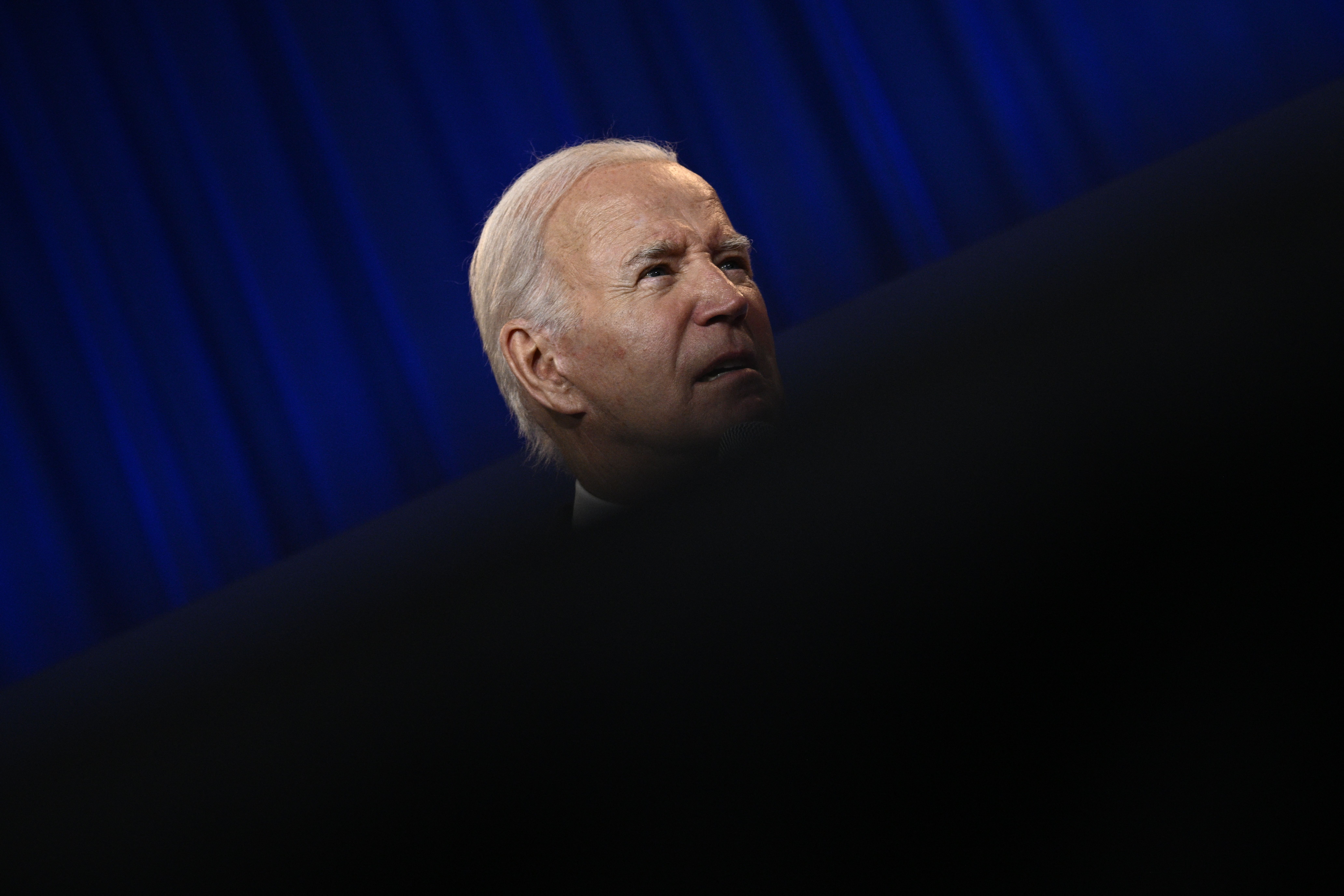‘Whistling past the graveyard’: Dem fear grows over massive grassroots fundraising hit
The decline is a major warning sign as the presidential campaign heats up.


One of the best online fundraising days for Democrats this year was the day of Joe Biden’s campaign launch — but even that day’s haul was meager compared to his campaign kickoff four years ago.
That’s among the findings of an analysis of fundraising for the first half of the year through ActBlue, the party’s primary donation processor. Small-dollar giving at the federal level totaled $312 million in the first half of 2023 — a drop-off of more than $30 million compared to this point in the 2020 cycle. The platform also had 32 percent fewer donors in the second quarter this year compared to four years prior, although its total fundraising increased slightly due to several factors, including more recurring donors and greater giving to non-federal groups.
“Because small donors are a proxy for enthusiasm, if people aren’t concerned about the drop-off in contributions, then they just aren’t paying attention or whistling past the graveyard,” said Ari Rabin-Havt, who served as deputy campaign manager on Sen. Bernie Sanders’ 2020 presidential campaign. “The impact is from top to bottom. You can see it in the ActBlue number, you can see it from the DNC down through every group. There has to be a quick examination among Democrats about what is creating this enthusiasm gap.”
The lack of grassroots engagement is a warning sign for Biden ahead of a tough election cycle, raising questions about whether the 80-year-old incumbent is exciting the Democratic base the way he will need to win a second term. The new data also suggests that the threat of Donald Trump, once a huge driver of Democratic fundraising, is not motivating donors like it used to.
Online fundraising has been critical for Democrats over the last few cycles, allowing the party to keep control of the Senate in 2022 while powering Biden’s 2020 bid. The party still far outraised their Republican counterparts on the corresponding WinRed platform.
Still, a decline in activity among Democratic grassroots supporters will almost assuredly force candidates up and down the ballot to spend more time fundraising, lean more heavily on big donors or make do with less.
Some progressive groups have already been laying off staff this year amid the ongoing cash crunch. Donations are also down to party committees, such as the Democratic Congressional Campaign Committee and Democratic Senatorial Campaign Committee, which both saw more than one-third drops in their total cash raised from small-dollar donors in the first half of the year compared to last cycle.
Democrats’ best fundraising days so far this year were largely end-of-month or end-or-quarter deadlines, according to a POLITICO analysis of data from ActBlue. Those are the days when campaigns typically send extra fundraising appeals.
When Biden formally launched his campaign April 25, he received roughly 57,000 online donations across his official committee and Biden Victory Fund, a joint fundraising group, totaling nearly $2.9 million.
That was less than in 2019, when Biden took in more than $4 million dollars from online donations on the day of his campaign launch. And yet, it was enough to make April 25 among the best federal fundraising days on ActBlue this year, with only the end-of-quarter deadlines in March and June seeing more money raised across the platform.
A Biden campaign official noted the now-president’s campaign had different day one goals compared to 2019, when getting a large number of day-one donors was a way to stand out in a crowded primary field. The campaign has touted that around 30 percent of its donors did not give to Biden in 2020. And the president’s small-dollar operation has also shown other positive signs, including less drop-off following the campaign launch.
In 2019, 60 percent of Biden’s first quarter online fundraising came in his first week. But this time, first-week fundraising accounted for only 38 percent of his ActBlue fundraising through the end of June.
But the relative dearth of strong fundraising days outside of quarterly deadlines suggests that Democratic donors are less driven by political events now than they were in 2019, when Trump was still in office and a competitive Democratic primary led to frequent national spotlights for the party’s candidates.
In fact, the major Trump-related events this cycle — like his court appearances in April and June — have been dates where Republicans have won the fundraising game. WinRed, the primary GOP fundraising platform, saw more donations those days than ActBlue. That was primarily driven by Trump fundraising through that platform in those moments. But other Republican groups have harnessed the former president’s indictment in fundraising appeals too. The National Republican Congressional Committee’s best online fundraising day of the year in terms of total money raised came a few days after Trump’s second indictment, according to WinRed data.
“Villains raise money. And you have the ultimate villain in Donald Trump,” said Rabin-Havt. “But it’s the third act of that villain at this point. That makes it harder. We are approaching nine years of him being the principal villain.”
Four years ago, Democratic presidential candidates raked in millions of dollars online after strong debate showings, with fundraising also driven by other campaign events and candidates’ calls for Trump’s first impeachment. In 2021, concern about the events of Jan. 6 and Trump’s second impeachment drove up Democratic donations early in the cycle. And just last year, the Supreme Court’s Dobbs decision on abortion sparked major online giving.
Some operatives in the digital fundraising space said they were not yet ready to hit the panic button, noting that summer months often are slower and that the Republican primary remains unsettled. But even their optimism was colored with concern.
“We get to this point in the cycle, every two years and people act like the summer slump is something they just discovered. People don’t like donating in the summer because they’re with their families and on vacation,” said Mike Nellis, founder and CEO of Authentic, one of the party’s top digital fundraising agencies. “That said, this is a particularly bad summer slump. If you’re not running with a particularly compelling headwind, it is hard to fundraise right now. If you’re not Adam Schiff and Jon Tester, who are two of my clients doing well right now, you’re sort of in a bind.”
Nellis attributed some of the decline to tactical matters. The major email providers have cracked down on political spam and social media companies have made it harder for campaigns to target donors, forcing a greater reliance on bulk buy email vendors. The current attempts to cull together an effective email list were akin, he said, to “sticking dynamite into a lake, hoping some fish will rise to the surface.”
Biden has run a lean campaign, and the many legal challenges facing Trump, while good for the ex-president in terms of fundraising, also mean that Trump is spending a lot.
Even with the Trump indictment boost, Republican groups have not escaped the lower small-dollar totals compared to the past few cycles, although WinRed’s shorter history makes it harder to do one-to-one comparisons.
And though there are far fewer events that seem to inspire big influxes, a few things have helped out some Democratic candidates. Schiff, one of several Democrats running for Senate in California next year, received more than 56,000 donations via ActBlue over two days in June when he was censured by House Republicans over his role in investigating Trump.
Some groups have also seen event-driven jumps, albeit at a smaller scale. The Tennessee Democratic Party’s federal account received more than 3,500 donations April 7, the day after two Black state lawmakers who had protested in favor of gun law reforms on the House floor were expelled from the legislature.
Prior to that, the state party had averaged seven donations per day.
Sam Stein contributed to this report.












